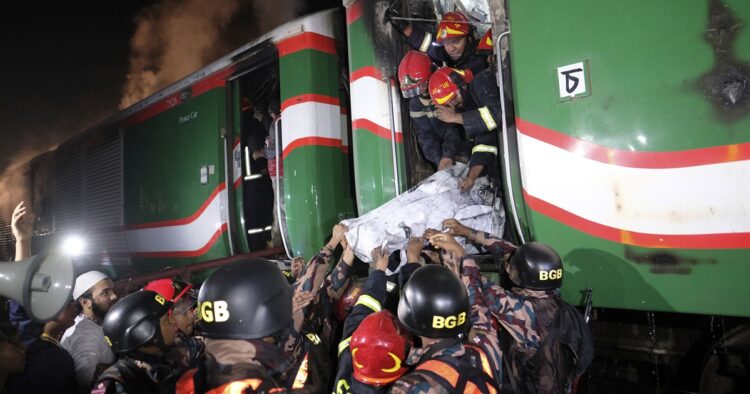In Bangladesh’s capital, an apparent arson fire on a train late Friday killed four people, adding to the tension ahead of Sunday’s parliamentary elections. The opposition plans to boycott and disrupt the elections with a general strike. The fire, which targeted a passenger train, was described by police as an attack aimed at intimidating people before the voting. No suspects have been named yet.
Elections in Bangladesh are often marred by violence, and this one is no exception. The political landscape is dominated by two powerful women—current Prime Minister Sheikh Hasina and former premier Khaleda Zia. Zia’s Bangladesh Nationalist Party and other opposition groups are boycotting, claiming the elections won’t be free or fair under Hasina. They demanded a neutral caretaker government, but Hasina’s government insisted on following the constitution.
The train fire occurred as it headed to Dhaka’s main railway station at 9 p.m. Authorities recovered at least four bodies from the train. Police suspect sabotage, with an additional police commissioner calling it a deliberate act to create fear before the election. Investigations are ongoing, but no political party or group has been named as a suspect.
Campaigning officially ended on Friday morning, with elections set for 299 constituencies out of 300 on Sunday. The Election Commission postponed one constituency’s election due to the death of an independent candidate. The opposition, led by Ruhul Kabir Rizvi, is urging people not to vote on Sunday and has called for a 48-hour general strike beginning Saturday morning.
Despite the opposition’s calls, Prime Minister Hasina addressed the nation in a televised speech, asking for forgiveness if mistakes were made. She urged people to head to ballot stations and promised an opportunity to correct any errors if re-elected. This election has drawn international attention, with the UN closely monitoring the process for transparency and organization.
Critics accuse Hasina of suppressing the opposition through repressive security measures, with Zia’s party claiming over 20,000 opposition supporters have been arrested. The government disputes these figures, stating arrests were for criminal charges, not political leanings. Troops have been deployed across the country to assist during the elections, and foreign observers, including journalists, are authorized to monitor the process.
As tensions rise, the election in Bangladesh is poised to be a critical and closely watched event, with concerns over violence and fairness in the democratic process.

















Comments